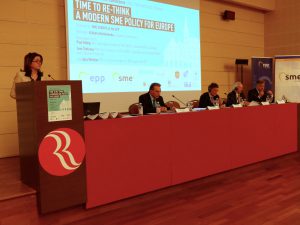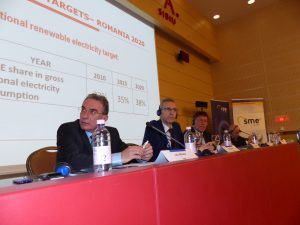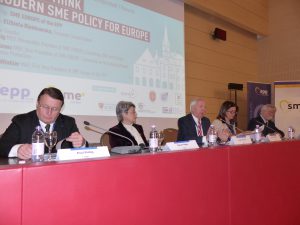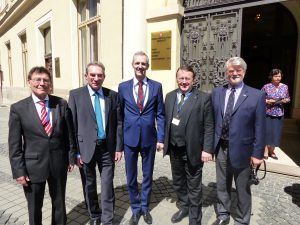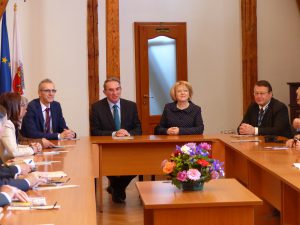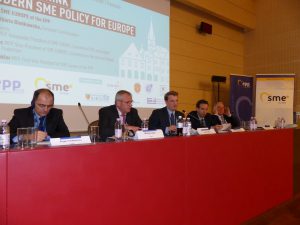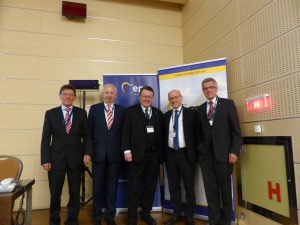European Economic Conference with Business Trip to SIBIU (Romania): “Time to re-think a modern SME Policy for Europe”
On 22th of April SME Europe in cooperation with Iuliu Winkler MEP organised a 3-day Business Trip to the one of the most eminent economical centres of Romania – Transilvania.
The first Vice president of SME Europe Iuliu Winkler MEP opened the conference with a warm welcome and a huge thank you to all guests and speakers for coming to Sibiu. Carmen Marcus, Economic Governance Officer of the Representation of the European Commission in Bucharest, gave an introduction towards general financial possibilities for SMEs in Romania. Subsequently Eberhard Sinner, President of OstWest Wirtschaftsforum Bayern and former Former State Minister for European Affairs of Bavaria, emphasized the importance of international cooperation and asked the participants of the conference to use the opportunity to build bridges between countries. In the same direction, Ingo Friedrich, President of European Economic Senate, Former Vice-President of the European Parliament and Honourable President of SME EUROPE, pleaded to create the European Common Good together. Afterwards, the Acting President of Sibiu County Council, Constantin Sovaiala, presented the advantages of Sibiu for foreign investors. The city is situated in the center of Romania, has a good infrastructure and less bureaucracy.
Panel discussion:
Then the first panel discussion started and tried to answer the question: “From regional structures to global markets – is Europe on the right track to make SMEs fit for the future?” Ivan Stefanec MEP, Vice President of SME Europe, pointed out the importance of SMEs for economic growth and presented the efforts by the European parliament to strengthen SMEs. Zoltan Nagy-Bege, Bucharest branch President of the Hungarian Economists’ Society of Romania, spotlighted on renewable energies as important future market. Eberhard Sinner, the President of OstWest Wirtschaftsforum Bayern and former State Minister for European Affairs of Bavaria, emphasized that European cooperation is a necessity for all European member states and that especially SME are profiting from that cooperation. Christian Weinberger, Senior Adviser and Business Co-ordinator for the Danube Region and EU Macroregional Strategies at the Federal Ministry for European Integration and Foreign Affairs of Austria, presented various projects of cooperation between European regions. He emphasized that is it important for investors to invest not just in projects but also in the education of workers to make their investments profitable.
After a short coffee break the second Panel discussion “European Financial and Subsidies Policy – Between Grants, Taxes and Competition (especially in the context of middle and Eastern Europe)” started. First Paul Rübig MEP, Honourable President of SME EUROPE, named conditions for an investor and SME friendly environment: A fair tax system, investments in education and low trade barriers for SMEs. An environment with these conditions fulfilled will bring prosperity for all citizens. Carmen Marcus took the chance to present the European Commission’s Agenda to support economic growth in the European countries. She said that, in case of Romania, measures have to be taken to strengthen the trust of the people into Romanian institutions to improve the business environment. Agnes Nagy, Board member of the Central Bank of Romania and professor University of Babes-Bolyai Cluj-Napoca, presented the macroeconomic data of Romania. The country has shown a very positive development and provides a lot of good investment opportunities. However she also warned that there is a danger of a growth in GDP of 3% and an unsustainable increase in wages of 12%, which structurally speaking is no easy task to fulfil.
After the second panel discussion the participants were invited to an official welcome at the city hall of Sibiu. This welcome was organised by Astrid Cora Fodor, Mayor of Sibiu, which emphasized the good development of Sibiu in the last year and the bright future to come.
The afternoon session handled the following matter: “European Funds and Business Cases” with Rolf Baron von Hohenau, President of the Taxpayers Association of Europe and President of the Bavarian Taxpayers Association, encouraging the constant pursuit of tax evaders whilst Michael Jäger, Chief Executive Director of the European Economic Senate, highlighted that companies must take responsibilities indeed for their successes but also their shortcomings, if they are to be effective in future projects. Eugen Iordanescu, Director General of the Chamber of Commerce, Industry and Agriculture Sibiu, claimed that public spending is responsible for making Sibiu what it is today. Infrastructure has been built through public decisions and cooperation. Wiegard Helmut Fleischer, Executive Director of the German Economic Club of Transylvania, added that Klaus Joh, President of Romania (2000-2015) helped bringing out the very best of Sibiu by attracting foreign investors, a development resulting in long term working positions for many people. He also suggested that the need for follow ups on pilot projects are necessary in order to ensure a secure future.
After the panel discussion, the participants enjoyed a Lecture on: “Financing possibilities for companies” by Ágoston Olti, Chief Executive Officer of OTP Consulting. He proceeded to explain that many new opportunities for SMEs in terms of funding have been made available through schemes such as Horizon 2020. However, he mentioned that many SMEs were unable to profit from such support as they were hindered in areas such as: Financial reform, bureaucracy, no support from SME projects and lack of ICT opportunities.
Rudolf Lukavsky, Commercial Counsellor of the Austrian Embassy, followed by conducting a lecture on: “Business Environment and Investments in Romania”. Mr. Lukavsky explained that Austria is the top European investor in CEE countries. He acknowledged that FDI is highly important in Romania and that most GDP comes from this FDI. He went on to highlight the attractions of Romania as an investment due to its knowledge of languages, similar culture, infrastructure plans and competitive labour costs amongst many others. However, he also stated the draw backs as a lack of transparency and bureaucracy in national institutions. He finished off my mentioning the success of Austrian enterprises in Romania such as Raiffeisenbank and OMV.
The last lecture was conducted by Christian Mainka, Secretary for Economic Development and Project Management of Wennigsen City, on the matter of: “European funds – Experience sharing of Success Projects”. He presented his ideas for the most successful and effective uses of EU funding in various actions and subsidies. He also addressed the development of programmes for SMEs including funding and projects, as well as the availability of consultation, personal service providers and workforce qualifications.
Iuliu Winkler MEP took the closing word by saying that every crisis has made Europe stronger and that mang opportunities lie before SMEs in Europe. He went on to state that SME EUROPE believes in Europe and that a prosperous SME sector leads to a prosperous community.

